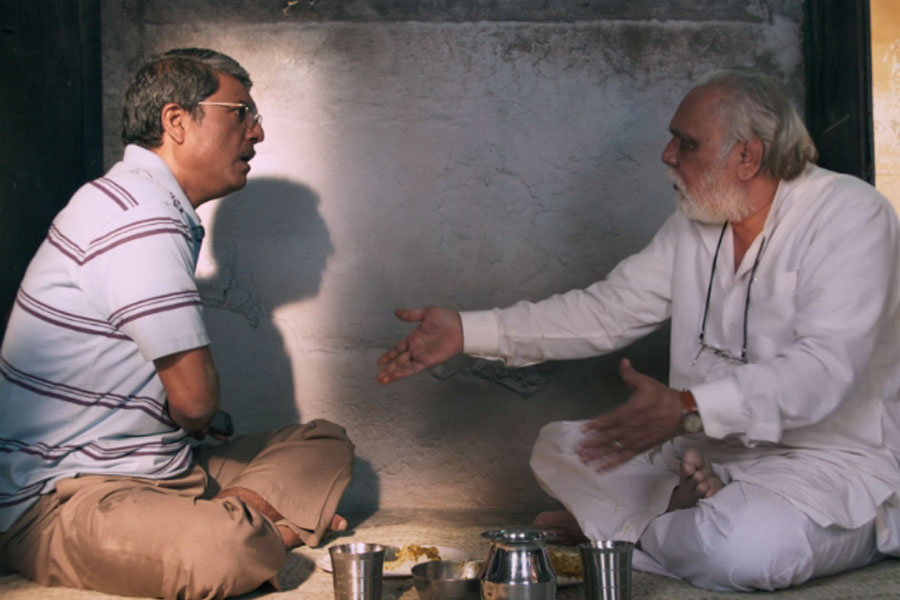Mukti Bhawan is an evenly paced story, narrated with care and dignity. It never “tries” to make a point, preferring to merely indicate and whisper what it wants to stay.
The story addresses two things – the inevitability of death and the often contradicting bond between a father and his son. What is enjoyable is the minimal treatment, and the intelligent and studied performances of Adil Hussain as the beleaguered son and Lalit Behl ‘s superb turn as the father.
The plot centers around Mukti Bhawan, a hotel in Benares where old people come to die. The film mainly explores the relationship between the father and the son. It is strained at best. The son has a job that clearly isn’t sufficient to afford luxuries for his family, and supporting a demanding father does not help. Taking him to Benares and staying at Mukti Bhawan for 15 days, cooking for him, tending to his whims, stretches is to breaking point. But he bears it, as do we. After all, he has only a few more days to live. For that is the rule of Mukti Bhawan.
When the inevitable death does not come, the son is at a loss. He is relieved that his father is alive, and tormented at the uncertainty of what should be done next. All of this happens with little fuss. The screenplay ambles along unhurriedly, staying largely within the ancient and ruining settings of the hotel. We are introduced to Vimla, an elderly woman waiting for her salvation for 18 years now, in the hotel. She shares a kinship with the father, and becomes a conduit between the two as the film progresses. It is in fact her demise that ultimately resolves the lingering situation between them, taking the film to its final act.
It is a tongue-in-cheek premise, and the makers of the film fully live up to the idea. The caretaker sternly proclaims that rooms are available only for 15 days. “What if one doesn’t die in that time?”, inquires the son. He raises his eyebrows, and replies “Don’t worry about that”. That is the kind of humor sprinkled gently through the scenes. The film opens on a dinner table of a small middle class house. The family patriarch has seen a dream that tells him he’s going to die. He’s convinced of this precognition, and wants to spend his last days in Benares. His son is taken aback at this proclamation. As soon as the father is out of hearing, he asks his wife “Did you tell him off on something?” It elicits a smile because you see the classic response of immediately questioning the woman of the house if the order of the day has been broken.
The film has solid female characters. The grand daughter, the wife, Vimla; they span three generations of our times. All three are essentially a foil for the central plot, sure. But they give surety and solidity to the men as father and son hack away at their insecurities in a decrepit room on the banks of the Ganges.
Mukti Bhawan is an evenly paced story, narrated with care and dignity. It never “tries” to make a point, preferring to merely indicate and whisper what it wants to stay.
The film ends in a celebratory parade on the streets of Benares as the father’s corpse is decked up and taken to the Ganges for his funeral. It represents a strange circle of life. The father gives life to his son, and leads him till he becomes the front-man. The same father then pushes his son to take him to the end of his life. The years in between may not have been happy, but both the beginning and the end of this cycle are moments of joy and happiness for both men.
Hindi, Drama, Color, 2017



Neurotic’s journey at it’s best!